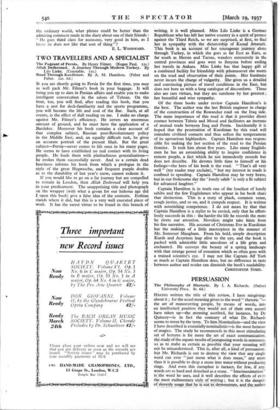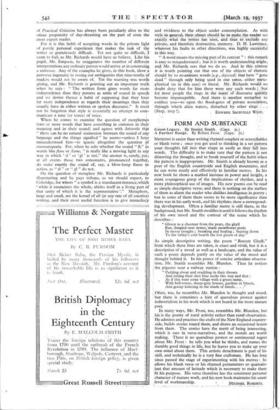PERSUASION
HAVING written the title of this review, I have misgivings about it ; for the usual meaning given to the word" rhetoric "- the art of manoeuvring people, by means of words, into an intellectual position they would not of their own accord have taken up—the meaning ascribed, for instance, by De Quincey—is in fact the contrary of what Dr. Richards seems to mean by the term. To him Nominalism—and the view I have described is essentially nominalistic—is the most heinous of magics. The study he recommends in this most stimulating set of lectures is far more the art of exact communication, the study of the organic results of juxtaposing words in sentences, soi as to make as certain as possible that your meaning will not be misunderstood. This is, after all, a kind of persuasion; but Mr. Richards is out to destroy the view that any single word can ever "just mean what it does mean," any more than it is possible to drop a stone into water without producing rings. And even this metaphor is inexact, for few, if any. words arc as hard and detached as a stone. " Interinanimation " is the word he uses, and it well describes the effects of evzn the most rudimentary style of writing ; but it is the dangers of slovenly usage that he is out to-demonstrate, and the author
. . . , _ _ of Practical Criticism has always been peculiarly alive to the otiose propensity of day-dreaming on the part of even the most expert reader.
For it is this habit of accepting words in the private light of purely personal experience that makes the task of die writer so gratuitously difficult. Yet not quite so difficult; ,I seem to feel, as Mr. Richards would have us believe. Like his pupil, Mr. Empson, he exaggerates the number of different interpretations any ordinary person would arrive at in construiug a sentence. Any of the examples he gives, in this book, show ,a perverse ingenuity in nosing out ambiguities that nine-tenths 9f readers would not be aware of. Yet the warning was worth giving, and Mr. Richards is pointing out an important truth when he says : "The written form gives words far more independence than they possess as units of sound in speech and we derive thence a habit of supposing that they have far more independence as regards their meanings than th4y usually have in either written or spoken discourse." It must not be forgotten that style is essentially an attempt to com- municate a tone (or tones) of voice.
When he comes to examine the question of morphemis (two or more words that have something in common in their meaning and in their sound) and agrees with Aristotle thit "there can be no natural connexion between the sound of any language and the things signified" he seems—unless I haye misunderstood him—to ignore altogether the question tiff onomatopoeia: For, when he asks whether the Sound "fl," words like flare or flame, "is really like a moving light in any way in which sl ' or gl ' is not," the answer is, surely, yes; at all events those two consonants, pronounced together, do make' exactly the sotind of, say, a blow-lamp flame in action, as " sl " or " gl " do not.
On the question of metaphor Mr. Richards is particularly illuminating and he pays tribute, as we should expect, to Coleridge, for whom "a symbol is a translucent instance, whiCh 'while it enunciates the whole, abides itself as a living part of that unity of which it is the representative '." Metaphors, large and small, are the kernel of all (at any rate of all emotive) writing, and their most useful function is to give immediacy
and vividness to the object under contemplation. As with style ip-sguerai, theiriol?iegt- hould be te.-make the reads; see exaCily .What the writer_ h. sen, and tills to exclude any piivate, and therefore destructive, memory. D. H. Lawrence, whatever his faults in other directions, was highly succeisful in 'this way.
"A word means the missing part of its context " : this remark is easy to misunderstand ; .hut it is worth understanding aught, and --Mr. Richards sees that we do so. And in this context it is worth pointing out that one of the objects of rhetoric should be to re-animate, words (e.g.,' dejected) that have "gone dead" through only being used in one sense, either meta- phorical (as in this case) or literal. Mr. Richards would no doubt deny that for him there were any such words ; but foi, 'host people the rings in the wirer- a -discourse quickly become imperceptible. And there' ii,-another metaphor to confuse you—to open the flood-gates of :private association, thtoPgh which alien waters, disturbed by. other rings- . .





































































 Previous page
Previous page